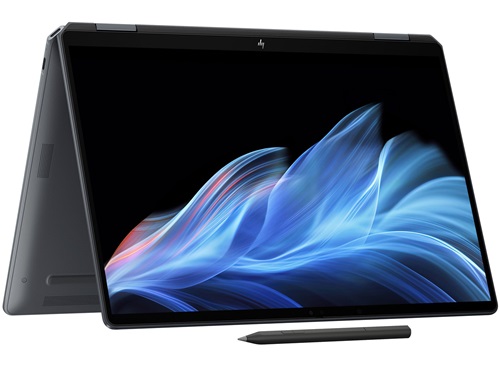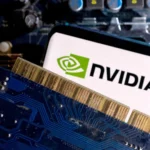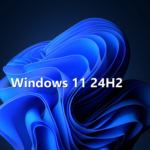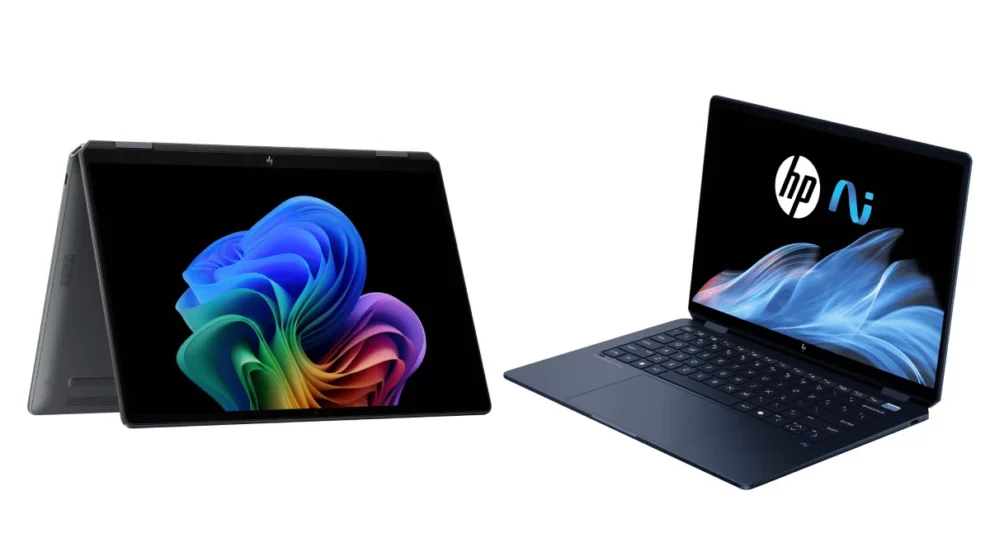HP’s latest entry in the premium laptop market, the Omnibook Ultra Flip 14, arrives as one of the first devices to feature Intel’s new Lunar Lake processor, offering an intriguing glimpse into the future of mobile computing. This $1,449 convertible laptop combines sophisticated design elements with next-generation technology, though the results prove somewhat mixed in real-world application.
Drawing inspiration from HP’s prestigious Spectre line, the Omnibook Ultra Flip 14 presents an elegant aesthetic with its aluminum chassis, featuring distinctive design elements like cleverly integrated USB-C ports in its flattened rear corners. Available in Eclipse Gray and Atmospheric Blue, the laptop maintains a professional appearance while incorporating practical convertible functionality, complete with a magnetically attached stylus that doesn’t interfere with port access.
The Intel Core Ultra processor series marks a significant focus on artificial intelligence capabilities, and here the Omnibook genuinely shines. The review unit, equipped with an Intel Core Ultra 7 258V processor, demonstrated superior AI performance compared to its competitors, with only dedicated GPU solutions managing to surpass it. This enhancement is evident in the smooth operation of both Microsoft’s Copilot and HP’s own AI Companion app, which offers additional system optimization features.
Perhaps surprisingly, the Omnibook excels in casual gaming performance despite relying on integrated graphics. The Intel Arc solution delivers impressive frame rates, managing 62.8 fps in Sid Meier’s Civilization VI and handling lighter titles like Donut Country at 100 fps. This represents a significant improvement over previous integrated graphics solutions and suggests promising developments in Intel’s Lunar Lake architecture.
However, the laptop’s core processing performance reveals some limitations. While achieving the highest single-core Geekbench 6 score (2,638) among its competitors, multi-core performance lags behind both Snapdragon-powered alternatives and previous-generation Intel systems. This disparity could impact users requiring intensive multi-tasking or content creation capabilities.
The 14-inch OLED touch display offers 2880 x 1800 resolution and proves capable in practical use, delivering vibrant visuals and sharp text, though technical measurements suggest room for improvement in color accuracy. The keyboard provides a satisfying typing experience, with users achieving impressive typing speeds despite relatively shallow key travel. The touchpad offers ample space and responsive performance, though the absence of USB-A ports might necessitate adapters for legacy peripherals.
Battery life presents another area where the Omnibook falls short of class leaders. While its 12-hour runtime should suffice for a typical workday, it significantly trails behind Snapdragon-powered competitors like the Dell Inspiron 14 Plus, which achieves over 18 hours. This disparity highlights the ongoing competition between Intel and ARM-based solutions in mobile computing efficiency.
The laptop’s thermal management impresses, maintaining temperatures well below comfort thresholds even during gaming sessions. The peak temperature of 88.5 degrees remains notably lower than the 95-degree threshold, with the touchpad staying particularly cool at 79 degrees. This thermal efficiency suggests careful engineering in the laptop’s cooling system.
One surprising strength emerges in the Omnibook’s video conferencing capabilities. The 9MP IR webcam delivers above-average video quality with good natural light handling, while the built-in microphone captures clear audio without common issues like background noise interference or voice distortion. These features make the laptop particularly suitable for remote work and online collaboration.
Starting at $1,449 for the base configuration with 16GB RAM and 512GB storage, the Omnibook Ultra Flip 14 positions itself in the premium laptop segment. The reviewed configuration, priced at $1,899, includes 32GB RAM and 2TB storage, representing a significant investment for users seeking maximum capability.
The Omnibook Ultra Flip 14 emerges as a fascinating study in tradeoffs and technological transition. While it showcases impressive advances in integrated graphics and AI processing capabilities, its limitations in multi-core performance and battery life suggest that Intel’s Lunar Lake platform is still finding its footing. For users prioritizing AI features and casual gaming capability in a premium convertible form factor, the Omnibook presents an attractive option. However, those requiring maximum multi-tasking performance or battery longevity might want to explore alternatives, particularly among Snapdragon-powered devices.
As one of the first Lunar Lake laptops to market, the Omnibook Ultra Flip 14 provides valuable insights into the evolving landscape of mobile computing, where traditional performance metrics are increasingly balanced against AI capabilities and specialized optimizations. While not perfect, it points toward an interesting future where artificial intelligence features play an increasingly central role in personal computing.
















Add Comment